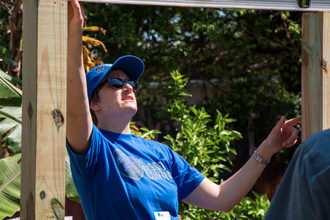Can Service on the Home Front Help Female Veterans Reintegrate to Civilian Life?
Aug 24, 2015

August 24, 2015
By Mary Beth Bruggeman
(Editor’s note: this piece originally appeared at The Huffington Post.)
When I was 11 years old, I attended a Navy vs. Air Force football game with my great uncle, a World War II veteran and a 1945 graduate of the U.S. Naval Academy. He was my friend, my mentor and my hero. We watched the midshipmen march onto the field, looking sharp and disciplined in their white uniforms.
I decided in that moment that this was a team I desperately wanted to be a part of, and I set my sights on attending the Naval Academy. With the unwavering support of my Uncle Paul and my parents (both former Peace Corps volunteers), I graduated from the Naval Academy with the Class of 1999, threw my military cover into the air on graduation day and immediately changed into the uniform of a U.S. Marine Corps officer. I have never in my life felt so proud, nervous, anxious and excited. I was part of a new team, an elite team, a band of brothers.
And that is exactly what it was…a band of brothers. Although I had an overwhelmingly positive experience in the Marine Corps — truly, I would change very little and I speak highly of my eight years as an officer — I was always aware of the divide between the men and women who served. The men were living representations of the classic picture of a Marine, from their appearance and physical abilities to their generally “Type A” personalities.
I, on the other hand, could have been voted most likely to hear the phrase “but you don’t look like a Marine.” Although I know these civilians had wonderful intentions behind their incredulous comments, they had no idea that their words made me feel so much “less than.” It was as though my service was invisible to them, or too surprising to be real. I was ever so slightly less than a Marine.
It wasn’t until very recently that I realized I wasn’t alone in feeling this way.

Earlier this year, The Mission Continues — a national nonprofit dedicated to helping post-9/11 veterans reintegrate into life after the military through service to their communities — conducted a series of interviews and a survey of our female members. Our research revealed that female veterans feel they need to prove themselves twice — in their military service and then again here at home.
Female veterans also often experience greater difficulty reintegrating than their male peers. While 44 percent of all post-9/11 veterans report that their readjustment is somewhat or very difficult, 82 percent of our female survey respondents reported that their readjustment was difficult. And, two-thirds of those surveyed reported that not being recognized for their service affected their identity as veterans.
It’s evident to me that service on the home front can be a productive solution to assist veterans with their reintegration. This sentiment appears to be even more pronounced among female veterans.
Specifically, among female veterans surveyed who participated in The Mission Continues community service programs:
- 94 percent reported that they felt comfortable and included within The Mission Continues’ culture (compared with 19 percent in civilian culture as a whole).
- 90 percent reported that they felt respected and valued as a veteran (more than double those that felt respected and valued in civilian culture).
- 72 percent reported that they formed bonds with civilians through The Mission Continues (compared with 30 percent who said the same about their reintegration into civilian culture).
My own experiences only support these findings. Since joining The Mission Continues this past March, I’ve re-found the sense of purpose I so valued while in the military. I’m part of a team that accepts and honors me for all of my characteristics. I’m able to lead again, and the feeling of pride and inclusiveness that I had when I stood on that field in my Marine Corps uniform after the Naval Academy graduation has been restored.
There are thousands of female veterans in our communities throughout the country. They may not look like military veterans to you, but they’re in desperate need of a new unit to which they can belong and a place where they can lead. Their mission continues.
Mary Beth Bruggeman, a Marine Corps veteran, is the executive director of the southeast region at The Mission Continues.





